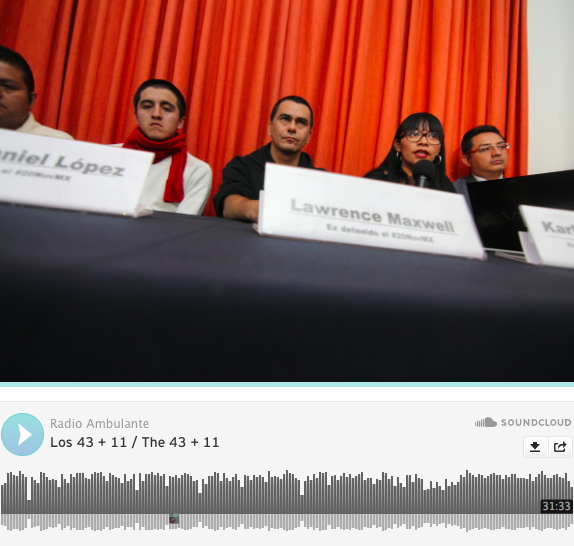
Screen capture of the Radio Ambulante website featuring an interview with Lawrence Maxwell, a Chilean student detained during a protest over events in Ayotzinapa.
Lawrence Maxwell, a Chilean man based in Mexico City, joined the ranks of the November 20th march in the city's central square Zócalo to show his solidarity with the 43 missing Ayotzinapa students. Within minutes, he was arrested along with 10 other participants.
But unlike his native Chile where, under similar circumstances, detainees usually spend a few hours in police custody before being released, Lawrence got an up-close-and-personal look at the violence inherent in the Mexican justice system.
In this interview with Radio Ambulante—narrated by his brother Dennis Maxwell—Lawrence, a sociologist and doctoral student at the National Autonomous University of Mexico (UNAM), recounts the jarring experience.
Dennis Maxwell begins the podcast explaining that his brother—just like hundreds of thousands of Mexicans—demonstrated against the government in response to the mass kidnapping of the 43 students and the savage and arbitrary violence of their case. The story of his arrest follows:
- “La noche de su arresto, Laurence había llegado al centro de la ciudad de México, a unas cuadras del Zócalo, para participar en la marcha. Se encontró con cientos de miles de manifestantes. Estaba amarrando su bicicleta a un poste, cuando de pronto se acercaron un grupo de policías.
The night of his arrest, Lawrence had arrived in the center of the Mexican capital, a few blocks from the Zócalo in anticipation of the march. There he encountered hundreds of thousands of demonstrators. He was in the process of locking his bicycle to a post when a group of police officers suddenly approached him.
Lawrence Maxwell describes how the arrest occurred:
Entonces, ya, dije, “bueno, lo que uno puede hacer aquí es tratar de salir caminando lo más tranquilo posible…supongo que no va a pasar nada”, ¿no? Trato de caminar, camino unos 3, 4, 5, 10 pasos quizás, y siento que un policía, como el que estaba a cargo al parecer de la operación, dice “agárrenlo a él también”.
So I said, “Ok, the best thing to do here is to try to walk away as calmly as possible…assuming nothing is going to happen,” right? I try to walk, walk 3,4, 5, 10 steps maybe, and I feel a police officer, like the one in charge of the operation, says, “Grab him too.”
Hitting and threatening him, the officers took him away. They covered his face with the hood of his jacket and dragged him across the square.
Later Lawrence detailed the verbal abuse he suffered at the hands of the police:
Me decían “aquí te chingaste cabrón, ahora sí nos toca a nosotros, ahora vas a ver,” o “vas a terminar en la cárcel”, o, no sé, como “terrorista” me decían, “delincuente”.
They said to me, “This is where you screwed up asshole, now it’s our turn, now you’re gonna see,” or, “You’ll end up in jail,” or I don’t know, like, “Terrorist,” they said, “Criminal’”
Dennis continued his story, this time about the interrogations:
Esa noche y al día siguiente, mi hermano y los otros 10 detenidos fueron interrogados una y otra vez. A Laurence le tocó con mayor intensidad, en parte porque no era mexicano. Según el policía que lo interrogó, mi hermano, como extranjero que era, no tenía derecho a involucrarse en la política mexicana.
“Tú viniste a sembrar caos, a hacer desorden, eres terrorista”, le decían. “¿Por qué mierda te fuiste a meter a esa marcha?”
That night and the next day, my brother and the other 10 detainees were interrogated over and over again. Lawrence took the brunt of it, in part because he wasn't Mexican. According to the officers who interrogated him, as a foreigner my brother had no right to involve himself in Mexican politics.
“You came here to stir up trouble, to disrupt things, you're a terrorist,” they said. “Why the hell did you go and get involved in this march?”
Later in the podcast, more details were provided about the police's use of threats. According to Dennis, the detainees were in the back seats, and now there were no longer 11 but 8, all men. The three women had been split off from the group. Six agents, all armed, guarded them, and one was particularly aggressive. As they drove away from Mexico City, this agent in particular said:
Laurence Maxwell: “Los vamos a llevar a Ayotzinapa y allá los vamos a trozar en pedacitos y los vamos a quemar” y después dice: “Pero en realidad mejor los tiramos de a uno de la camioneta y les damos un balazo y nos ahorramos tiempo y no sé qué…”
Lawrence Maxwell: “We are going to take them to Ayotzinapa and there we're gonna slice them to pieces and burn them,” adding, “But it would actually be better if we just threw them all out of the van and put a bullet in them and saved ourselves the trouble and I don't know what…”
Dennis Maxwell: “Aquí ya no hay derechos humanos”, les decían. “Aquí podemos hacer con ustedes lo que queramos.”
Dennis Maxwell: “There are no human rights here,” they said to them. “Here we can do what we want with you.”
The interview is a unique opportunity to hear first-hand what so many people who are arrested in Mexico go through in the hands of the justice system. The podcast can be heard in its entirely here.







2 comments